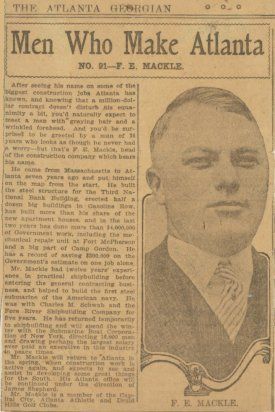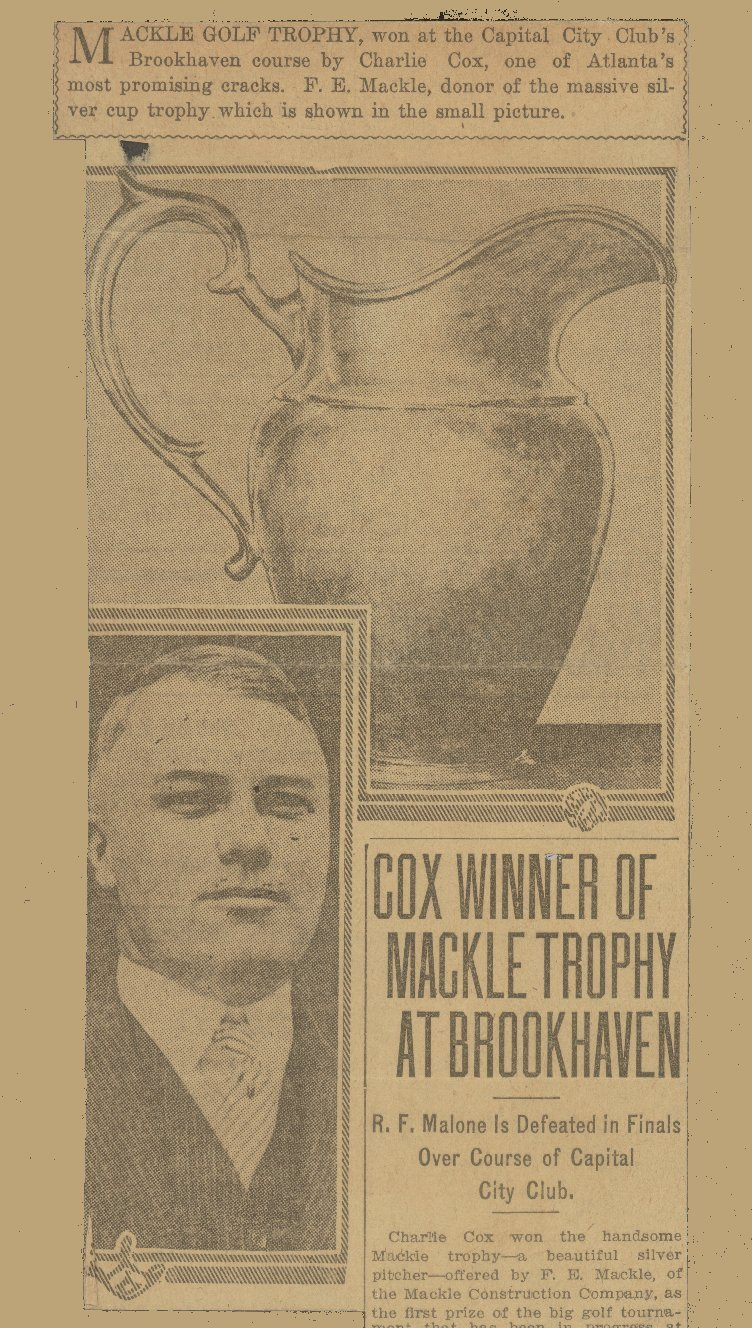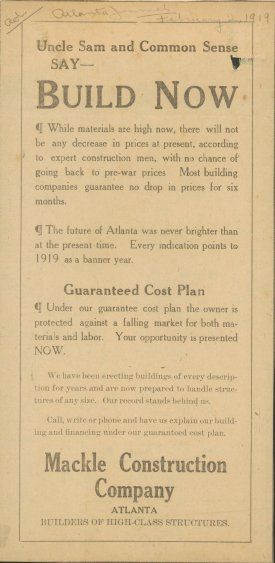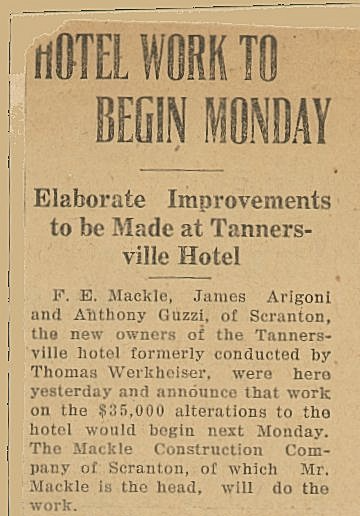HIS FATHER - FRANK ELLIOTT MACKLE SR.
Dad loved and admired his father deeply. While he did not often speak of his father, when he did, it was invariably a story of strength, integrity, honor and respect.
Francis Elliott Mackle Senior. was born in Barrow-in-Furness, England in 1881.
His father, James, died when Frank was five years old. His mother, Nancy married John Kendall a year later, in 1887. A year after that, in 1888 she and her four boys boarded a ship for America. Frank was six or seven when he left his home in England. The family settled in Elizabeth, New Jersey.
Elizabeth was an industrialized town on the north coast of New Jersey town, a few miles from New York City.
Around 1896 - when he was about fifteen years old - Frank went to work in the steel and ship building industry of Elizabeth.
Dad said that his father - in his youth - had been a prize fighter as well.
Frank became a citizen of the U.S. in 1902 at the age of twenty-one.
He lived in Elizabeth until about 1903 or 1904 when he move to Quincy, Massachusetts to work in the steel yards.
Frank was about 22 or 23.
In or near Quincy Frank was employed as a foreman on the first all-steel submarine which was built by Charles M. Schwab and the Fore River Ship Building Company.
It was in Quincy that he met Theresa Roche.
On January 5, 1908, Frank and Theresa were married in Quincy. Frank was 26 and Theresa was 22 years old.
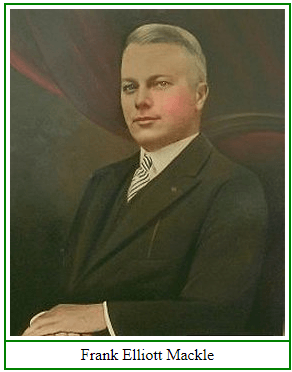
JACKSONVILLE
Further details are lost now but the image is one of a very tough, self assured young man. Those qualities - and perhaps his new bride - motivated him to leave the ship building job and set out on his own.
In 1908 - soon after their wedding - Frank and Theresa moved to Jacksonville. Their first son, Elliott, was born in that city late in the same year.
It was in Jacksonville in 1908 that Frank Sr. began the family construction business.
The article on the right - apparently from a Boston or Quincy paper announces the move to Jacksonville.
A big step for a young man of twenty six years of age!
Frank, Theresa and Elliott lived in Jacksonville until 1911 when they moved to Atlanta. His business in the early years was one of a General Contractor specializing in the erection of steel structures. He initially operated under the name of the Southern Erecting Company.
One other story Dad related late in life was that his father had come to Miami during his residence in Jacksonville - or perhaps a little later - to bid on the construction of Vizcaya. Vizcaya was eventually constructed between 1914 and 1916.
It was in Jacksonville - around 1911 - that he suffered his first major business setback.
Dad's story went that his father was a contractor on a bridge in the Jacksonville area and when a storm and resulting flood wiped out the under-construction bridge. Frank watched his newly found business "wash away".
The only evidence I have found is a small, undated, un-sourced article, apparently from a Boston or Quincy newspaper which tells a slightly different story.
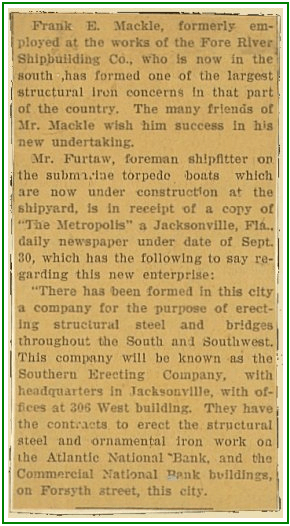
"Mr. Mackle had the contract for the ironwork for a large building being constructed at Jacksonville Florida which collapsed during a frightful windstorm. The building belonged to a firm in Berlin, CT and Mr. Mackle came north in order to adjust matters."
It was always a matter of family pride - as related by Dad - that on the occasions in Frank Senior's life when he was beset by financial difficulty that he stood by his obligations and eventually repaid everyone involved.
One of the gems that came from Frank Senior - and was repeated many times over the years - was a rewording of a common saying:
"Honesty is not the only policy, but it is the best policy"
ATLANTA
In 1911 Frank moved his family to Atlanta Georgia where they lived for the next ten years or so.
In Atlanta, his second son Robert was born in1912.
And on July 23rd, 1916 his son Frank Junior came in to the world.
In Atlanta Frank Senior achieved considerable success. He operated as a General Contractor, but soon expanded into the design-build business. In addition to contracting for others, he would acquire land, plan a building or project and sell the package.
Frank Senior was about 30 when he moved the family to Atlanta. During the next ten years he was a leading builder in the area.
BUILD NOW! was the headline in many of his advertisements.
During World War I Frank Senior was heavily involved in military contracts. Major expansion work at Fort McPherson and Fort Gordon were done by him.
As for many young men, the World War and the recession that followed brought unexpected changes.
In late 1918 and early 1919 Frank built ships again - in Philadelphia this time. This was apparently a short-term diversion. A December 18, 1918 article in the Atlanta newspaper noted that "F. E. Mackle has returned to shipbuilding...(and)...will return to Atlanta in the Spring".
He continued to advertise his construction business in Atlanta during this period.
Between 1911 and the early 1920s a number of projects were completed from his Atlanta headquarters. They include the steel work of the Cecil Hotel, the Third National Bank Building and many apartment buildings and commercial projects in addition to the military work of this period.
Reaching out in other parts of the South, Frank was the contractor on the Gesham Hotel in South Carolina as well.
Frank had taken up golf by now and was an active member of at least one club in Atlanta. Atlanta newspaper articles report the results of the Mackle Cup Tournament at the Capital City Country Club.
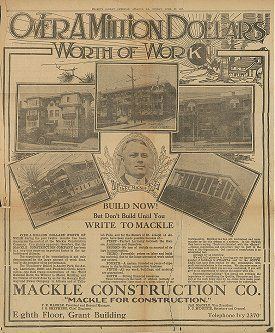

Camp Gordon Georgia
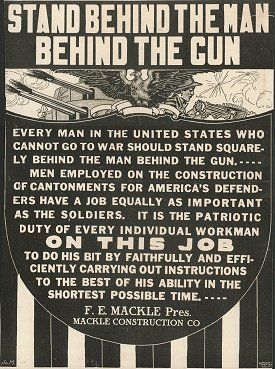
World War I
"The war to end all wars"
Early 1917-Nov. 11, 1918
(for the U.S.)
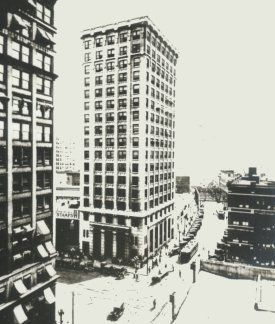
Third National Bank Building
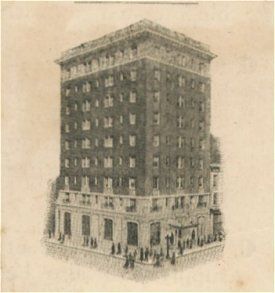
The Cecil Hotel
BUILDING AND MARKETING
TWIN BUSINESS TRADITIONS
Frank senior, it seems, had a streak of the "promoter" in him. From the first article written on his move to Jacksonville and throughout his life examples can be seen.
He always relied on advertising and publicity as a source of new business - a novel thing in those days for a commercial builder.
The constant theme was "Build Now!"
He was given great credit in articles written at the time for being a visionary and for his enthusiasm in the midst of a post-war recession.
The idea of design-build also required a great deal of "salesmanship". This was not a man waiting for business to come in the door! He was aggressively seeking and making business opportunities.
These were traits - along with the basic construction skills - that he handed down to his son Frank Jr.
Those skills and the optimism which went hand in hand served both of them well.
In 1920 or 1921 his father was forced to declare bankruptcy. I do not know specifically what events that led up to this.
After World War I there were two serious recessions - the first in late 1918 and early 1919 and the second from January 1920 thru July 1921. The 1920-21 recession still rates as the fourth worst annual decline in the Dow Jones Industrial average ever.
SCRANTON
In the early 1920's the Mackle family moved to Scranton Pennsylvania where they lived until 1924.
An article from this period refers to his new ownership - with two partners - of the Tannersville Hotel. Tannersville is a town 30 miles southeast of Scranton. The article goes on to say, "the Mackle Construction Company of Scranton... will do the (renovation) work"
Interesting that Frank's father, James Mackle, was - among other things - an Innkeeper, Frank Senior was once an owner of a hotel and his three sons would be hotel operators as well!
A line in this article states that, "the building will be fitted up with steam heat, hot and cold running water and electric lights, a private plant to be installed in case the electric wires are not extended to Tannersville this year."
Carbondale, a town about fifteen miles northeast of Scranton, was the site of other work. One headline reads
"Mackle Co. Completing Work on Three Projects"
which included two garages and the Calabro Hotel.
BIRMINGHAM
In 1924 the family moved again - this time to Birmingham, Alabama where they lived until 1933.
In Birmingham, there was again great success - at least for the first four or five years.
The archives contain clippings about a number of commercial buildings and homes built in the Birmingham area. Prominent is the construction of the eight story Medical Arts Building.
Also featured in the family archives - in the year or two prior to the 1929 stock market crash - are articles about the construction of the Rocky Ridge Golf and Country Club in Birmingham. The work on the new club was done by another contractor but the contract was let and supervised by the President of the club - Frank E. Mackle.
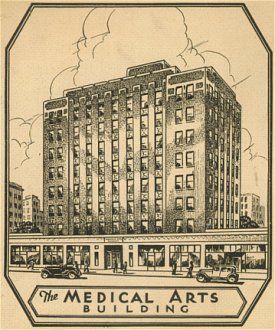
The Medical Arts Building
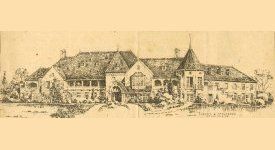
Rocky Ridge Country Club
NASHVILLE
In 1933 the family moved from Birmingham to Nashville.
There were again financial pressures - probably starting in the late twenties.
This time it was the Great Depression.
The details have been lost but from the letters to his son Frank Jr. - included in a later chapter - the difficulties of the mid 1930's can be sensed.
Nevertheless there were many building contracts and business accomplishments. Scrapbooks indicate that Frank was more involved in the construction of fine homes in the Nashville area.
There are two stories that I remember Dad telling about his father which I cannot place in time.
One was of a building constructed for Coca-Cola - I believe during the Depression - for which he was offered stock in lieu of cash. He took the cash. Of course the stock would eventually be worth a fortune.
The other involved a situation - apparently witnessed by Dad as a young man - where a drunken black laborer challenged his father and his father backed the man down by the shear force of will
Stock Market Crash
October 28 & 29, 1929
The Great Depression
1930 - 1939
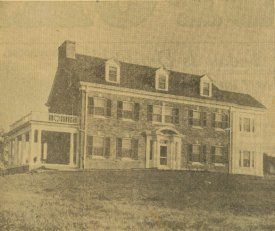
Contract for home in Belle Meade, a suburb of Nashville
FLORIDA
By 1938 things must have been going pretty well again. Most of this story will be told later but by that time Frank Senior and the family were planning to "winter" in Delray Beach, Florida. With the success of an early "test" Frank moved the family permanently to Florida in 1938.
In Florida, before his death, Frank Senior - now in business with his sons Elliott, Robert and Frank Jr. - built homes in Delray Beach, West Palm Beach and Miami.
At the very end of his life - a year before the U.S. became involved in World War II - he was again bidding on military projects.
In 1940, the Navy requested bids for 200 houses in Opa Locka - in the northwest section of Greater Miami. In December 1940 the Mackle Company was awarded the contract for $550,000 - $2,750 per house. Proud of his achievements for the government during the previous war Frank Senior and his sons completed the 200 houses on time and under budget.
The story was told that he went back to the Navy officer-in-charge proud to return the savings to the Navy that they had achieved. Shocked that anyone would return money to the government - and apparently concerned that his allotment for future projects would be cut - the officer refused the refund. Frank Senior was so appalled that he used the money to purchase items such as garden hoses and other "extras" and incorporated them into the homes.
Frank E. Mackle Senior died in Miami on October 27, 1941 at the age of sixty. It was a remarkable life and business career - a classic Immigrant-American success story.
And it set the stage for the story of ........
Florida's Famous Mackle Brothers
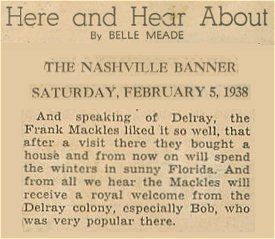
The Mackles will Winter in Delray!
1938

Frank Senior's Delray Home
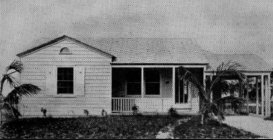
First Mackle-built Homes in Florida
Delray Beach, 1938
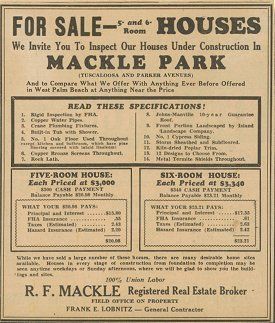
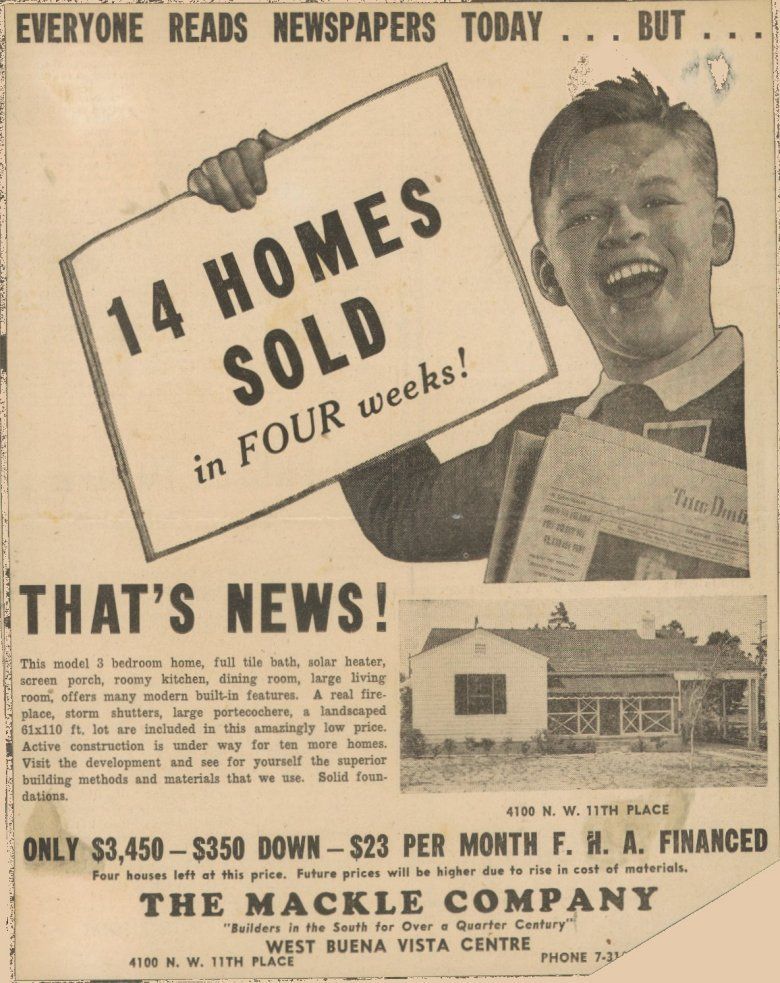
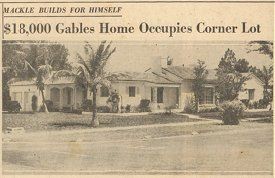
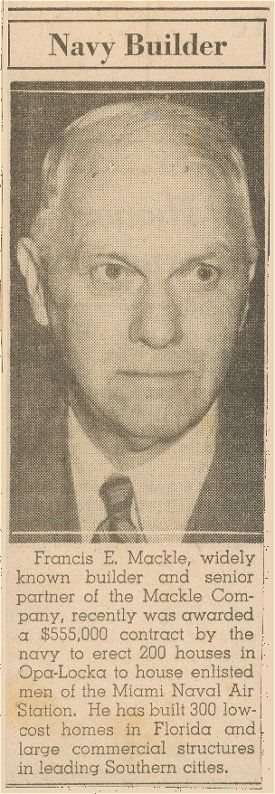
Navy Contract
200 Homes in Opa Locka
1940
